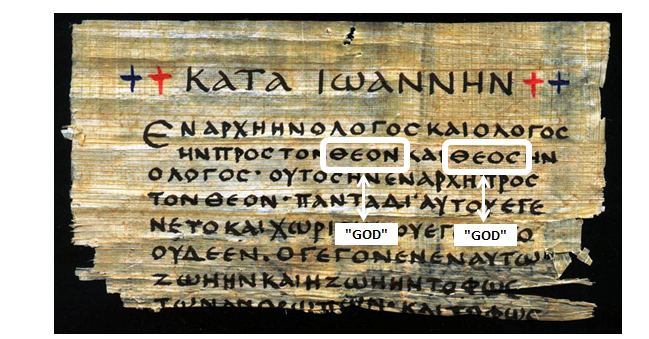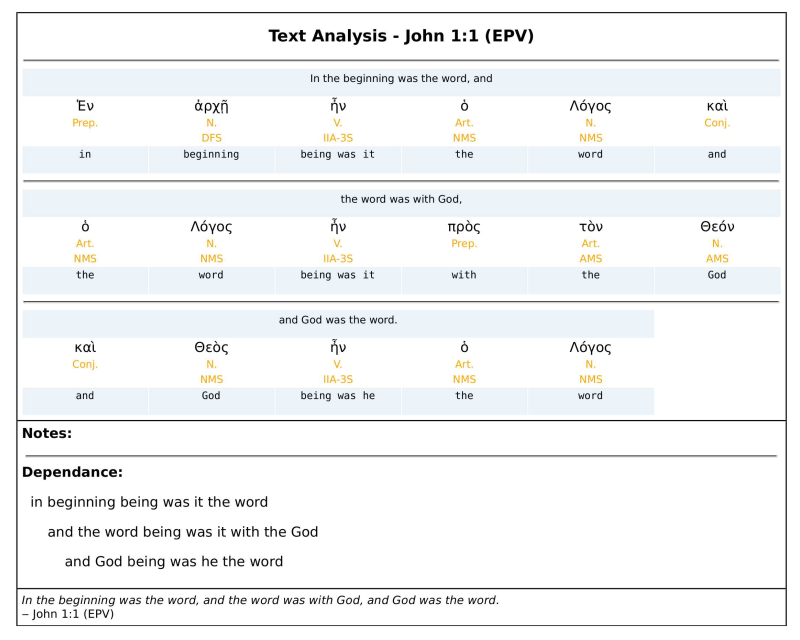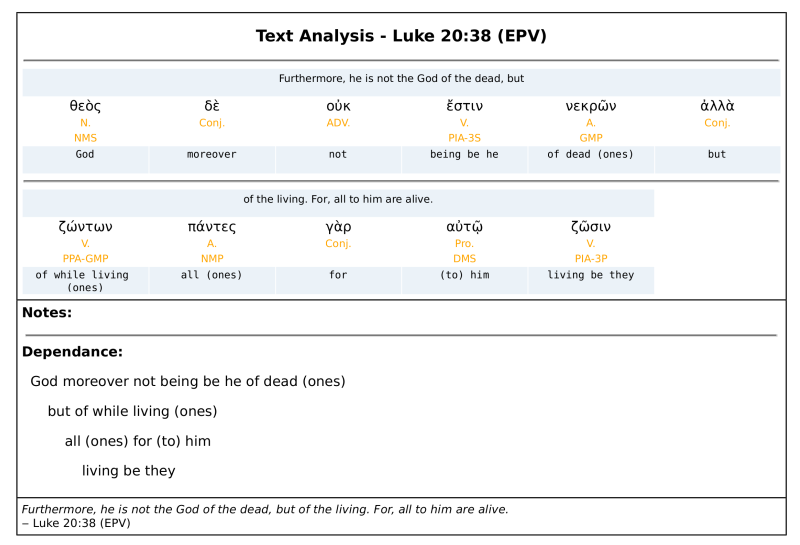Introduction
Is there any justification in the original Greek text for translating θεὸς into English as “a god”?
The early Church fathers never debated the Greek capitalization in John 1:1 since the earliest Greek manuscripts of the New Testament were written in a Greek text that consisted of only majuscules, or “capital” letters. For example, the following is an image of John 1:1 in the Codex Sinaiticus which is dated to the 4th century A.D.:


The Codex Sinaiticus features lunate sigmas and nomina sacra. Without the nomina sacra, the text would appear as follows:

Compare that text to the text of John 1:1 in the Textus Receptus which was written in 1550 A.D.:

While the Textus Receptus does incorporate both miniscules and majuscules, unlike the Codex Sinaiticus, it was written nearly 1 1/2 millennia after the original Greek New Testament was likely written, so it and similar manuscripts are entirely irrelevant to the issue at hand.
With that being said, any exegetical analysis of John 1:1 in order to affirm or deny the deity of the Lord Jesus Christ should not be focused on the capitalization of the Greek text or subsequent English translation.
The following is the text of John 1:1 separated into three clauses:
- 1:1a: ΕΝ ΑΡΧΗ ΗΝ Ο ΛΟΓΟϹ (ἐν ἀρχῇ ἦν ὁ λόγος)
- 1:1b: ΚΑΙ Ο ΛΟΓΟϹ ΗΝ ΠΡΟϹ ΤΟΝ ΘΕΟΝ (καὶ ὁ λόγος ἦν πρὸς τὸν θεόν)
- 1:1c: ΚΑΙ ΘΕΟϹ ΗΝ Ο ΛΟΓΟϹ (καὶ θεὸς ἦν ὁ λόγος)
The First Clause: ΕΝ ΑΡΧΗ ΗΝ Ο ΛΟΓΟϹ
In the first clause, ΕΝ ΑΡΧΗ ΗΝ Ο ΛΟΓΟϹ, the author appears to be alluding to Gen. 1:1 wherein the LXX translates the Hebrew בְּרֵאשִׁית (bĕrēʾšît) by the Greek ΕΝ ΑΡΧΗ.
Karen H. Jobes wrote,1

Footnotes
1 p. 58, Commentary on 1 John 1:1
The author of the fourth gospel wrote that Ο ΛΟΓΟϹ, which may be translated into English as “the word,” “was in the beginning” (ΕΝ ΑΡΧΗ ΗΝ). It is noteworthy that the author does not write ΕΝ ΑΡΧΗ ΕΓΕΝΕΤΟ Ο ΛΟΓΟϹ (ἐν ἀρχῇ ἐγένετο ὁ λόγος), which would suggest that Ο ΛΟΓΟϹ was made or came into existence (ΕΓΕΝΕΤΟ).2 Rather, it suggests that Ο ΛΟΓΟϹ is pre-existent and eternal. In Gen. 1, this “word” was spoken to create the universe.3
Footnotes
2 cf. John 1:6, 1:14
3 Gen. 1:3
The Second Clause: ΚΑΙ Ο ΛΟΓΟϹ ΗΝ ΠΡΟϹ ΤΟΝ ΘΕΟΝ
The interpretation of this clause is relatively straightforward, with the exception of the preposition ΠΡΟϹ (πρὸς). Ο ΛΟΓΟϹ, or “the word,” was ΠΡΟϹ ΤΟΝ ΘΕΟΝ.
ΤΟΝ ΘΕΟΝ
The majority of (if not all) commentaries agree that ΤΟΝ ΘΕΟΝ in John 1:1b refers to the eternal creator of the universe, Ο ΘΕΟϹ of Gen. 1:1.
ΠΡΟϹ
Most English translations translate ΠΡΟϹ (πρὸς) by the preposition “with.” However, we might rather expect the Greek to have used the preposition ΜΕΤΑ (μετά), as in ΜΕΤΑ ΤΟΥ ΘΕΟΥ (μετὰ τοῦ θεοῦ), or ΣΥΝ (σύν), as in ΣΥΝ ΤΩ ΘΕΩ (σὺν τῷ θεῷ), to indicate that Ο ΛΟΓΟϹ was with ΤΟΝ ΘΕΟΝ. Nevertheless, there is still a precedent for translating ΠΡΟϹ ΤΟΝ ΘΕΟΝ into English as “with God.”4
Footnotes
4 Matt. 13:56; Mark 6:3, 9:19, 14:49; Luke 9:41; 1 Thes. 3:4; 2 Thes. 2:5, 3:10
The Third Clause: ΚΑΙ ΘΕΟϹ ΗΝ Ο ΛΟΓΟϹ
Finally, the clause in question. The author writes that Ο ΛΟΓΟϹ (“the word”) ΗΝ (“was”) ΘΕΟϹ. In the second clause, ΘΕΟϹ in the form of the definite, accusative ΤΟΝ ΘΕΟΝ referred to the Father (Yahveh, the creator of heaven and earth). But, Ο ΛΟΓΟϹ could not logically be identical with the Father because the second clause also stated that Ο ΛΟΓΟϹ was “with” the Father. To express a simpler analogy: if David was with Saul, then David cannot be the same person as Saul. Rather, the clause indicates that Ο ΛΟΓΟϹ and ΤΟΝ ΘΕΟΝ (1:1b) are two distinct persons.
But, if ΘΕΟϹ does not refer to the Father, the creator of heaven and earth (cp. Gen. 1:1), then to what or whom does it refer?
ΘΕΟϹ κατὰ φύσιν or ΘΕΟϹ κατὰ καθήκον
The real issue concerns whether Ο ΛΟΓΟϹ is ΘΕΟϹ κατὰ φύσιν (“according to nature”),5 or ΘΕΟϹ κατὰ καθήκον (“according to office”).6
Footnotes
5 Latin secundum naturam
6 Latin secundum officium
ΘΕΟϹ κατὰ φύσιν
Undoubtedly, Yahveh, the creator of heaven and earth, Ο ΘΕΟϹ of Gen. 1:1, ΤΟΝ ΘΕΟΝ of John 1:1b, is ΘΕΟϹ κατὰ φύσιν. Being ΘΕΟϹ κατὰ φύσιν, Yahevh is eternal and uncreated, omnipotent and omniscient. All else is NOT ΘΕΟϹ κατὰ φύσιν, for all else is created and finite.
ΘΕΟϹ κατὰ καθήκον
Scripture sometimes describe others aside from Yahveh as being ΘΕΟϹ, or its Hebrew equivalent אֱלֹהִים (ʾĕlōhîm). For example, Moses was appointed אֱלֹהִים to Pharaoh.7 The judges of Israel are referred to as אֱלֹהִים (ʾĕlōhîm).8 Satan is referred to as ὁ θεὸς of this world.9 Spiritual messengers (“angels”) are referred to as אֱלֹהִים (ʾĕlōhîm).10
Footnotes
7 Exo. 7:1; LXX: θεὸν
8 Exo. 21:6, 22:8, 22:9; Psa. 82:1
9 There is some debate whether ὁ θεὸς τοῦ αἰῶνος τούτου refers to Yahveh or Satan. My interpretation is that it refers to Satan as the instrumental agent of the blinding, while elsewhere Yahveh is identified as the ultimate agent of the blinding (Isa. 6:10 cf. John 12:40). Also cf. 2 Sam. 24:1; 1 Chr. 21:1.
10 LXX: ἀγγέλους cf. Heb. 2:7, 2:9
All of these instances have one thing in common: none of those described as ΘΕΟϹ, whether Moses, judges, Satan, or spiritual messengers (angels), are ΘΕΟϹ κατὰ φύσιν, since they are all created. Logically, then, they must all be ΘΕΟϹ κατὰ καθήκον, or “GOD according to office.”
One who is ΘΕΟϹ κατὰ καθήκον is identified as ΘΕΟϹ because he is granted authority or power by Yahveh and thus functions in Yahveh’s stead. For example, Moses is described as ΘΕΟϹ to Pharaoh because Moses judged Pharaoh and Egypt as Yahveh acted through him to execute judgment against Egypt and its “gods.”11 Likewise, the judges of Israel are referred to as ΘΕΟϹ because they judge for Yahveh, and Yahveh is with them in judgment.12 Angels (spiritual messengers) are sometimes referred to as ΘΕΟϹ because they too render judgment on behalf of Yahveh.13 However, in the case of Satan, he is not granted authority, but rather seeks to usurp Yahveh’s authority.14
Footnotes
11 Exo. 12:12
12 2 Chr. 19:6
13 1 Chr. 21:16
14 Whether Isa. 14:13–14 and Eze. 28:2 refer to Satan even by allusion is inconsequential. More importantly, they demonstrate that anyone who attempts to usurp Yahveh’s authority is a “god” in their own mind.
Ο ΛΟΓΟϹ is ΘΕΟϹ κατὰ φύσιν
Is Ο ΛΟΓΟϹ, ΘΕΟϹ κατὰ φύσιν or ΘΕΟϹ κατὰ καθήκον? The answer is determined by answering this simple question: is Ο ΛΟΓΟϹ created or uncreated? If Ο ΛΟΓΟϹ is created, then Ο ΛΟΓΟϹ is ΘΕΟϹ κατὰ καθήκον. However, if Ο ΛΟΓΟϹ is uncreated, then Ο ΛΟΓΟϹ is Yahveh and thus ΘΕΟϹ κατὰ φύσιν.
Although there is a slight allusion to the answer in John 1:1, in order to definitely answer the question, we must skip forward two verses to John 1:3. Referring to Ο ΛΟΓΟϹ, the author wrote,15
3 Everything was made by means of it,16 and not even one thing that was made was made without it.
Γʹ πάντα δι᾽ αὐτοῦ ἐγένετο καὶ χωρὶς αὐτοῦ ἐγένετο οὐδὲ ἕν ὃ γέγονεν
Footnotes
15 There is no necessity to write majusculars as the Greek word θεὸς does not occur in this verse and there is no possibility of confounding the topic of discussion.
16 At this point in the prologue, I would prefer to translate the pronoun as “it” because anyone reading this passage for the very first time (also, 2000 years ago) would not have assumed by v. 3 that Ο ΛΟΓΟϹ is actually the pre-incarnate Lord Jesus Christ. This is methodically and intentionally introduced shortly thereafter by the author.
The author writes that “everything was made by means of” Ο ΛΟΓΟϹ, using the preposition δι᾽ (διά). Those who argue that Ο ΛΟΓΟϹ is created emphasize that everything was created “by means of” rather than “by” Ο ΛΟΓΟϹ. Not only is this argument unconvincing, it is inconsequential. Even if we suppose that everything was created “by means of” Ο ΛΟΓΟϹ as the instrumental cause,17 the author still states that everything was created by means of Ο ΛΟΓΟϹ.
Footnotes
17 Rather than as the effective cause, where δι᾽ (διά) might be properly translated as “by.”
Logically, Ο ΛΟΓΟϹ could not have been used by the efficient cause (e.g., the Father) as the instrumental cause to create everything if it had not been created yet. In order for the efficient cause to have used Ο ΛΟΓΟϹ as the instrumental cause to create everything, Ο ΛΟΓΟϹ itself cannot be created, but rather, Ο ΛΟΓΟϹ must have already existed prior to creation. Of course, to exist prior to creation demands that Ο ΛΟΓΟϹ is uncreated, and if Ο ΛΟΓΟϹ is uncreated, then it must be ΘΕΟϹ κατὰ φύσιν.
- If everything was made by means of Ο ΛΟΓΟϹ (1:3a),
- And not even one thing that was made was made without it (1:3b),
- Then Ο ΛΟΓΟϹ cannot be made,
- Because something not yet made (i.e., that does not yet exist) cannot be used to make itself.
ΘΕΟϹ in John 1:1c defines φύσις or οὐσία
While ΤΟΝ ΘΕΟΝ in John 1:1b (and therefore Ο ΘΕΟϹ in Gen. 1:1) refers to the person18 of Yahveh, i.e., the Father, ΘΕΟϹ in John 1:1c refers to the φύσις or οὐσία of Ο ΛΟΓΟϹ, often translated into English as “nature.”
Footnotes
18 πρόσωπον, and in later philosophical and theological discussions, ὑπόστασις.
Aristotle’s Categories
Perhaps 500 years prior to the conception of Christianity, Aristotle wrote many philosophical discourses concerning the nature of the things in the universe. In one such discourse, entitled “Categories” (Κατηγορίαι), he defines two types of οὐσίαι or “natures,” the former being “the primary natures” (αἱ πρῶται οὐσίαι), and the latter being “the secondary natures” (αἱ δεύτεραι οὐσίαι).
Primary οὐσίαι, he wrote, are things such as “the certain (individual) man” (ὁ τὶς ἄνθρωπος) or “the certain (individual) horse” (ὁ τὶς ἵππος). Other examples would be “Peter,” “Paul,” “Yahveh,” and you the reader.
On the other hand, secondary οὐσίαι categorically encompass the primary οὐσίαι. For example, Peter is a human (ἄνθρωπος), which loosely refers to his species (εἶδος), and he is also an animal (ζῷον), which loosely refers to his genus (γένος). The εἶδος and γένος, human (ἄνθρωπος) and animal (ζῷον), respectively, are secondary οὐσίαι.
Categorically,
- Genus (γένος) - δευτέρη οὐσία (e.g., “animal”)
- Species (εἶδος) - δευτέρη οὐσία (e.g., “human”)
- Individual (ὁ τὶς) - πρώτη οὐσία (e.g., “the individual human”)
Just as ἄνθρωπος (“human”) is a πρώτη οὐσία, so is θεός (“god”). Hippolytus wrote the following concerning Aristotle,19
Aristotle, who was a pupil of this man (Plato), reduced philosophy into an art, and was very logical, hypothesizing that the fundamental elements of all things were “nature” (οὐσίαν) and “accident” (συμβεβηκός): one nature (οὐσίαν) underlying everything, but nine accidents (συμβεβηκότα): quantity, quality, relation, where, when, possession, posture, action, passion. Thus, nature (οὐσίαν) is such a thing as “god” (θεὸν), “human” (ἄνθρωπον), and each of the potentials falling under a similar denomination.
Ἀριστοτέλης τούτου γενόμενος ἀκροατὴς εἰς τέχνην τὴν φιλοσοφίαν ἤγαγεν καὶ λογικώτερος ἐγένετο. τὰ μὲν στοιχεῖα τῶν πάντων ὑποθέμενος οὐσίαν καὶ συμβεβηκός. τὴν μὲν οὐσίαν μίαν τὴν πᾶσιν ὑποκειμένην, τὰ δὲ συμβεβηκότα ἐννέα. ποσὸν ποιὸν πρός τι ποῦ πότε ἔχειν κεῖσθαι ποιεῖν πάσχειν. τὴν μὴν οὖν οὐσίαν τοιαύτην εἶναι οἷον θεὸν ἄνθρωπον καὶ ἕκαστον τῶν τῷ ὁμοίῳ λόγῳ ὑποπεσεῖν δυναμένων.
Footnotes
19 Book 1, Ch. 17, p. 24–25
When we speak of something’s οὐσία, we are attempting to define “what it is.” You, let’s call you by the name “Joe,” are human, or ἄνθρωπος. ἄνθρωπος is your οὐσία (secondary οὐσία, according to Aristotle). But, as Yahveh is living, He, too, must have an οὐσία. What is Yahveh? The οὐσία of Yahveh is θεός (i.e., Yahveh is θεός).
All too often, Christians misinterpret θεός as being a name, but properly, it is a common noun referring to a thing. It primarily identifies what something is, not who someone is. On the other hand, a proper noun, or name, primarily identifies an individual, i.e., who someone is. For example:
- Peter (a name identifying “who?”) is human (a nature identifying “what?”).
- Yahveh (a name identifying “who?”) is god (a nature identifying “what?”).
John of Damascus wrote,20
“We have frequently stated that essence (οὐσία) is one thing and hypostasis (ὑπόστασις) another, and that essence (οὐσία) signifies the common and general species (εἶδος) of hypostases of the same species (ὁμοειδῶν), such as “God” (θεός), “human” (ἄνθρωπος), but hypostasis (ὑπόστασις) signifies the individual, that is to say, “Father,” “Son,” “Holy Spirit,” “Peter,” “Paul.” Well then, one must know that “divinity” (θεότητος) and “humanity” (ἀνθρωπότητος) are names of essences (οὐσιῶν) or natures (φύσεών), but “God” (θεὸς) and “man” (ἄνθρωπος) are applied in reference to natures (φύσεως), whenever we say, “God is an incomprehensible essence (οὐσία),” and “God is one.” But, it is also understood of in reference to hypostases (ὑποστάσεων) when the name of the more general is applied to that which is more specific, as when the scripture says (Psa. 45:7), “Therefore, O’ God, your God has anointed you...” (for behold, it indicates the Father and the Son), and as when it states, (Job 1:1), “There was a certain man in the land of Uz” (for, it only indicated Job).”
Ὅτι μὲν οὖν ἕτερόν ἐστιν οὐσία καὶ ἕτερον ὑπόστασις, πλειστάκις εἰρήκαμεν, καὶ ὅτι ἡ μὲν οὐσία τὸ κοινὸν καὶ περιεκτικὸν εἶδος τῶν ὁμοειδῶν ὑποστάσεων σημαίνει οἷον θεός, ἄνθρωπος, ἡ δὲ ὑπόστασις ἄτομον δηλοῖ ἤτοι πατέρα, υἱόν, πνεῦμα ἅγιον, Πέτρον, Παῦλον. Ἰστέον τοίνυν, ὅτι τὸ μὲν τῆς θεότητος καὶ τῆς ἀνθρωπότητος ὄνομα τῶν οὐσιῶν ἤτοι φύσεών ἐστι παραστατικόν, τὸ δὲ θεὸς καὶ ἄνθρωπος καὶ ἐπὶ τῆς φύσεως τάττεται, ὁπόταν λέγωμεν· Θεός ἐστιν ἀκατάληπτος οὐσία, καὶ ὅτι εἷς ἐστι θεός· λαμβάνεται δὲ καὶ ἐπὶ τῶν ὑποστάσεων ὡς τοῦ μερικωτέρου δεχομένου τὸ τοῦ καθολικωτέρου ὄνομα, ὡς ὅταν φησὶν ἡ γραφή· «Διὰ τοῦτο ἔχρισέ σε ὁ θεὸς ὁ θεός σου» (ἰδοὺ γὰρ τὸν πατέρα καὶ τὸν υἱὸν ἐδήλωσε), καὶ ὡς ὅταν λέγῃ· «Ἄνθρωπός τις ἦν ἐν χώρᾳ τῇ Αὐσίτιδι» (τὸν γὰρ Ἰὼβ μόνον ἐδήλωσεν).
Footnotes
20 Book 3, Ch. 4, p. 997–998
As John of Damascus noted, the name of a nature may be applied in reference to a an individual, i.e. a primary οὐσία.
For example,
- Peter is human (ἄνθρωπος).
Here, ἄνθρωπος refers to species, or secondary οὐσία.
However,
- Peter is the human (ὁ ἄνθρωπος).
Here, ἄνθρωπος is used to refer to a particular individual of the species ἄνθρωπος (i.e., ὁ τὶς ἄνθρωπος); the individual is also known as a ὑπόστασις (hypostasis). If you recall, earlier we said that ὁ τὶς ἄνθρωπος referred to a primary οὐσία; thus, a ὑπόστασις is also equivalent to οὐσία in the sense of primary οὐσία, not secondary οὐσία.
ΘΕΟϹ in John 1:1c defines φύσις or οὐσία (continued)
In John 1:1b, ΤΟΝ ΘΕΟΝ identifies a particular individual who is ΘΕΟϹ in nature; this person or ὑπόστασις is Yahveh (the Father). The definite article indicates a reference to an individual or ὑπόστασις.
On the other hand, ΘΕΟϹ in John 1:1c identifies the secondary οὐσία (nature) of Ο ΛΟΓΟϹ. ΘΕΟϹ tells us what Ο ΛΟΓΟϹ is. Since we established that Ο ΛΟΓΟϹ is ΘΕΟϹ κατὰ φύσιν, and only Yahveh is ΘΕΟϹ κατὰ φύσιν, then Ο ΛΟΓΟϹ must also be Yahveh, like the Father (ΤΟΝ ΘΕΟΝ in 1:1b). What the Father is, the Son is. Both are god in nature. The capitalization of “god” is irrelevant. The fact that both are god in nature, rather than office, indicates that both are the eternal creators of the universe.
References
Hippolytus. Origenis Philosophumena sive Omnium Hæresium Refutatio. Ed. Miller, Emmanuel. Oxonii: E Typographeo Academico, 1851.
Jobes, Karen H. Exegetical Commentary on the New Testament: 1, 2, & 3 John. Ed. Arnold, Clinton E. Grand Rapids: Zondervan, 2014.
John of Damascus (Ἰωάννης ὁ Δαμασκηνός). “An Accurate Exposition of the Orthodox Faith” (Ἔκδοσις Ἀκριβὴς τῆς Ὀρθοδόξου Πίστεως). Patrologiæ Cursus Completus: Series Græca Prior. Ed. Migne, Jacques Paul. Vol. 94. Petit-Montrouge: Imprimerie Catholique, 1857.









